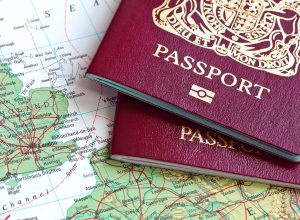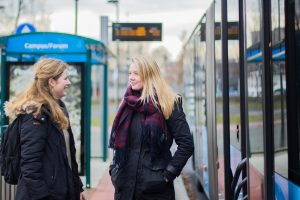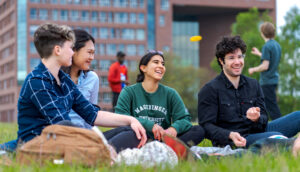First Weeks in Wageningen: A Guide
When I first found out I was accepted to Wageningen University, I was over the moon. But after the excitement wore off, I suddenly realized that I had no idea how to actually prepare for life in the Netherlands. Looking back, I wish someone had told me a few simple things that would have made my first weeks so much smoother. And I wasn’t the only one! My friend, Zlati, also had a similar experience, which is why we are sharing them with you today.
Paperwork and Papers
The first big hurdle for me was the paperwork. Since I needed a visa and residence permit, I uploaded documents, paid the fees, and nervously waited for updates from the IND. The process felt endless at times, but WUR guided me step by step.
My tip: “Don’t procrastinate, one missing form can delay everything.”
Something I also realized early on is that it’s not just about online applications, you also need to carry a set of physical documents with you when you first arrive in the Netherlands. These papers make things like municipality registration, insurance, and banking much easier, and in some cases, they’re mandatory. Here’s what I brought with me (and what I now recommend to anyone coming to Wageningen):
-
Print-out of my housing contract for municipality registration;
-
Apostilled and translated birth certificate;
-
A few passport-size photos;
-
A Forex card as backup for payments;
-
Copies of my passport and visa;
-
Medical reports and prescriptions;
-
My actual passport with visa.
Having all of these in a folder gave me peace of mind during the chaotic first week. More than once, I saw fellow students scrambling to get missing documents sent from back home. Being prepared really made my transition smoother.
Banking and Money
When it came to finances, I knew I had to figure out banking fast and luckily, I found out there’s a way to open an account even before you get your Dutch BSN number. The BSN (Burgerservicenummer) is like a Dutch Social Security number. It’s your unique ID in the government system, and you need it for things like health insurance, rental contracts, jobs, or even some types of bank accounts.
I learned that some banks like ABN AMRO and Bunq let you open a student account without a BSN at first, as long as you provide it within a set time frame later. That saved me a lot of stress. I didn’t need to wait days for my BSN before setting up my finances
When I arrived in the Netherlands, I opened an ABN AMRO Student Package. It’s free for students aged 18–30 and comes with a debit card, mobile and internet banking, and even a free savings account. Within a few days, my debit card arrived at my address – super convenient. I could pay for groceries right away and handle university payments without worrying about cash.
Housing
Housing was the part I had been most worried about, but luckily I had done my homework before applying. I read several international student blogs on the WUR website, and almost all of them stressed the importance of registering on room.nl as soon as possible. So, the moment I received my admission letter, I signed up.
Once you actually receive your room offer, one very useful tip is to check with Idealis if they can share the contact details of the previous tenant (or sometimes even the tenant who is about to leave). This happened in my case, and it turned out to be a lifesaver. I was able to buy some second-hand items directly from the previous tenant. Things like cupboards, a TV, cabinets, and other furniture. It completely removed the hassle of trying to transport or purchase heavy items from scratch, especially since I was arriving from abroad.
But here’s something important I learned the hard way: you need to inform Idealis and send them a list of the items that will remain in the room before you arrive. If you don’t, everything left behind will be thrown out by the cleaning service.
Transportation and the OV-chipkaart
One of the first practical things I had to sort out after arriving in the Netherlands was transportation. Wageningen doesn’t have its own train station, so you often need to take the bus to Ede-Wageningen or Arnhem before catching a train to other cities. That’s where the OV-chipkaart comes in. It’s the rechargeable travel card you use on all Dutch trains, buses, trams, and metros. Without it, you’ll end up paying expensive single-use tickets each time.
I ordered mine online through the official OV-chipkaart website before classes started. You can choose between a personal card (with your name and photo) or an anonymous card. I chose the personal card, since it allows you to load subscriptions and also helps others to notify you if it is stolen. The application was simple. I uploaded a passport photo and filled in my Dutch address. About a week later, the card arrived in my mailbox.
The first time I used it, I had to top it up at a machine in Ede station. It was a little confusing, but soon I got used to the system of “checking in” when you enter a bus or train and “checking out” when you leave. I did forget to check out once and got charged the full fare, a classic rookie mistake! But after that, it became second nature.
What I like most about the OV-chipkaart is how flexible it is. Whether I was going for groceries in Wageningen, visiting friends in Utrecht, or joining a weekend trip to Amsterdam, I only needed this one card in my wallet.
Academic Preparation: My First Week at WUR
Settling into academic life was just as important as sorting out my housing and paperwork. Before classes began, I registered for my courses and made sure I had the basics ready some notebooks, pens, and my laptop. I also skimmed through my course schedule and read the learning agreements. Most first classes don’t require heavy preparation, but occasionally you need to download readings or assignments beforehand, so I got into the habit of checking my Outlook emails and Brightspace announcements daily.
If the slides for the first lecture were uploaded, I gave them a quick read just to know what was coming. Sometimes I wrote down questions, even though most of them were covered during the introductory lecture. That little bit of preparation helped me feel more confident.
Practical organization also made my first week less stressful. I double-checked my timetable, learned where my classrooms were, and left early whenever I wasn’t sure of the building. Apps like Osiris and Brightspace became my best friends for keeping track of classes and exams. Exploring campus before lectures began also helped. I found the Forum library, the canteens, cafés, and the sports centre, all of which later became part of my daily routine. Most importantly, I reminded myself that it was okay to make mistakes. Taking a deep breath and allowing that first week to be a learning curve was the best mindset I could have had.
Making Friends in a Small University Town
Wageningen isn’t a big city, but that’s part of its charm. Because the town is small, it’s easy to meet people, and almost everyone is connected to the university in some way. For me, making friends started right from the AID (Annual Introduction Days). That’s where I met my first group of international and Dutch students. Sharing those first experiences like getting lost together, biking in the rain, or exploring campus, helped us bond quickly.
After AID, it became easier to expand my circle. I joined events through ISOW, and said yes to house dinners and spontaneous pancake nights in my student home. Sports clubs, language exchanges, and volunteer groups like the UNICEF Student Team also gave me opportunities to connect with people outside my immediate courses. Even casual encounters in Spot café or the canteen sometimes turned into lasting friendships.
Looking Back
“If I could give my past self advice, I’d say: don’t stress about being perfect. You’ll forget to check out with your OV-chipkaart, you’ll get lost on your way to class, and you’ll probably misunderstand Dutch directness a few times. But that’s all part of the experience. Wageningen may be small, but it’s incredibly international and welcoming and with the right balance of preparation and openness, you’ll soon feel at home” – Devi
“Take a deep breath! It will be okay! Initially, I was worried about a lot of things but then they always turn out alright. Having worries is completely normal when beginning new life in a different country, but don’t let that lead you.
Grab your bike and get purposely lost, go out with friends for a nice walk in the city centre or to watch the ducks at the Rhine, just do something! Go to that party, do the crazy thing you’ve always been wanting to try.
Those things really do make a difference and will make your experience in the Netherlands even more unforgettable!” – Zlati
Best Regards
Devi & Zlati








